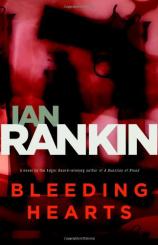Bleeding Hearts
Review
Bleeding Hearts
Whether or not Ian Rankin's John Rebus police procedurals or his
stand-alone works are seen as "literary" is totally irrelevant to
the elements that make all of them exciting, entertaining, often
funny, well plotted and a cut above the ordinary. His ironic twists
accelerate the pace and keep readers breathlessly carried along by
the action. BLEEDING HEARTS is the newest thriller to appear in the
United States --- it was published in England in 1994 under the
pseudonym Jack Harvey. In it, we follow the trajectories of the
lives of two men: an assassin of international repute, and a former
NYPD cop now turned private eye who has vowed to track down the
infamous killer and execute him.
The story opens in a hotel bar in England where me meet the killer,
Michael Weston, having a drink with a passing acquaintance. In his
first-person narration he tells readers that his mark has only
three more hours to live, while opining to his companion: "You know
what it's like these days --- only the toughest are making it. No
room for bleeding hearts though of course in my line of work
bleeding hearts are the business."
Today his assignment is to shoot a woman who will be leaving a
particular hotel, at a particular time, wearing a particular dress
patterned in yellow and blue. He has no idea who she is and doesn't
really care. Later, as the police show up at almost the precise
second he pulls the trigger, he can't believe what has just
transpired. How could they be here so quickly? he wonders.
His ad-hoc plan to leave the scene is to call 999 and ask for an
ambulance because, he tells them, he's "a severe hemophiliac" who
has been involved in a terrible accident and his head is
bleeding.
Weston in fact is a hemophiliac, albeit a mild one, and this twist
adds verisimilitude to the character that is more cerebral than
physical. As happens in life, his illness is a curse and a blessing
--- this time it is his means of escape and soon he is free. He now
can ponder what went wrong; this was supposed to be an easy hit.
His conclusion: he had to have been set up --- but by whom, and
why?
Weston must escape to safety and makes his way to an isolated farm
where Max and his daughter Belle live. They deal in arms of every
sort and sell to anyone with enough cash to pay for them. Weston
needs their support and access to their cache. He rests a bit and
plans an assault on a so-far phantom enemy.
Weston has always worked through a middleman, the gunrunner Max. He
never wanted to get "personally involved" with his victims or
paymasters. Death is only the result of the job he has to do; it is
a fact of life but not necessarily one he cares to analyze. He is
very smart, very careful, very dedicated and very lethal. He looks
like an average man of a certain age who is personable but reveals
nothing about himself to anyone.
Meanwhile, in Vine Street police station, Chief Inspector Bob
Broome comes to the conclusion that Weston, dubbed the "Demolition
Man," is the shooter. But the police have no clear evidence to
point to the real target. "The people on the [hotel] steps, that's
another thing. We've got a journalist [dead], a secretary of state,
and some senior guy from an East European embassy."
After a powwow with his detectives, Broome makes a call to the
United States --- to Leo Hoffer, who ran his own detective agency.
These days, Hoffer's only personal client is Robert Walkins, the
father of a young woman who the Demolition Man killed in a freak
accident, which so far was Weston's only miss. Walkins and Hoffer
have been obsessed with finding the D-Man and killing him.
Ian Rankin is one of those writers whose prose grabs the reader
with the first line. From there it's a heady journey through a
fast-paced, intelligent plotline, awash with characters who jump
off the page and a climax that turns everything the reader was
thinking upside down. BLEEDING HEARTS is not only a thriller about
a sniper and the man who tracks him. It is also a story that is
timely and raises issues of good and evil to a higher plane. Rankin
wants the reader inside the heads of his anti-hero and his nemesis.
Their thoughts, their rationalizations, their uncertainties, their
fears and their destinies are central to understanding what
motivates these people who do what they do. Readers are asked to
"stand back" and judge for themselves how evil or good these men
are. The supporting characters play no less a part in fleshing out
the architecture of the book, and they inhabit the space, each with
their own personalities and agendas, be they good or bad.
BLEEDING HEARTS is a challenge to read. It is gritty and tough, but
that's Rankin's trademark. All of his books explore the dark side
of people's lives and the underbellies of space they inhabit ---
but he balances that by shining a light into the hidden nooks and
the shadowed crannies that ultimately override the bad guys. The
body of work he has amassed speaks to his readability and
storytelling prowess. And while loyal fans look forward to the next
John Rebus installment, BLEEDING HEARTS is one of his best
stand-alone novels and is certainly a keeper.
Reviewed by Barbara Lipkien Gershenbaum on December 22, 2010





